Envy Vs. Jealousy: What You’re Really Feeling and How to Handle It
Can't tell if what you're feeling is envy or jealousy? You're not alone. These complex emotions are often misinterpreted and easily mishandled. In this eye-opening guide, you'll learn how to tell them apart, spot them in real life, and turn both envy and jealousy into tools for self-awareness and personal growth.


Back
8 mins read
I’ve always been fascinated by how certain words get tangled up in everyday conversation: sympathy vs. empathy, nice vs. kind, smart vs. intelligent, and shy vs. introvert. They feel similar, and we often use them interchangeably. But when you look closer, the differences matter more than you’d expect.
That’s exactly how I felt with two commonly confused words: envy and jealousy. I’d toss the two words around like synonyms, saying I was jealous when I meant envious. It seemed harmless at first. Then, I realized that mislabeling these emotions made them harder to understand and manage.
So, what’s the difference between envy and jealousy?
While Envy stems from desiring something of value that someone else has, jealousy originates from the fear of losing a valued possession to someone else. In this article, we’ll teach you how to spot the difference, why it matters, and the practical ways to deal with these emotions.
Related: Why Are Relationships So Hard (and How to Make Them Work Better)
9 Key Differences Between Envy and Jealousy

Not long ago, I watched an Instagram highlight reel of someone’s fun vacation in the Bahamas. The comments were dominated by a sea of “OMG, I’m so jealous!” Sure, it sounds normal. But truthfully, what they were feeling wasn't jealousy. Envy was the appropriate word here.
You might wonder, “Does it really matter which word I use?” Yes, it does. And here’s why.
Envy and jealousy stem from different triggers, affect your mindset and relationship differently, and appear in different parts of your life. Misunderstanding them makes it harder to name what you’re going through and nearly impossible to work through.
To clarify, here’s a quick side-by-side table that briefly breaks it down.
| Area of Comparison | Envy | Jealousy |
|---|---|---|
| Definition | Wanting what someone else has. | Fear of losing what you have. |
| Trigger | Someone else's status, success, possessions. | Threat to a valued relationship or position. |
| Types | Benign and Malicious. | Cognitive, Emotional, and Behavioral. |
| Number of Parties Involved | Two parties (you and the person who has what you want). | Three parties (you, your valued person, and the perceived threat). |
| Associated Feelings | Inferiority, admiration, discontent, bitterness, shame, frustration, longing, inadequacy, and silent resentment. | Fear of loss, insecurity, possessiveness, suspicion, anger, protectiveness, anxiety, and distrust. |
| Behavioral Clues | Silent comparison, bitterness, self-doubt. | Clinginess, passive-aggression, constant monitoring, accusations. |
| Inner Dialogue | "I want what you have." | "I’m afraid you’ll take what I have." |
| Impact on Relationships | May lead to the criticism of your partner's achievements and cause resentment. | May lead to feelings of mistrust and insecurity. |
| Benefit | To highlight what you desire. | To protect what you fear losing. |
The following sections will expand on some key areas of comparison.
Envy Vs. Jealousy: Definition and Types

Envy is the emotion you feel when someone else has something you want but lack, like their talents, positive traits, wealth, success, or lifestyle. In contrast, jealousy is the emotion that arises when you fear losing what you value to someone else. Envy requires two people while jealousy requires three.
Envy comes in two forms: benign envy, which motivates self-improvement, and malicious envy, which involves resentment and a hidden wish for others to lose what they have. Jealousy appears in three forms: cognitive (suspicious thoughts), emotional (insecurity and fear), and behavioral (controlling actions).
Envy Vs. Jealousy: What Are the Underlying Causes?
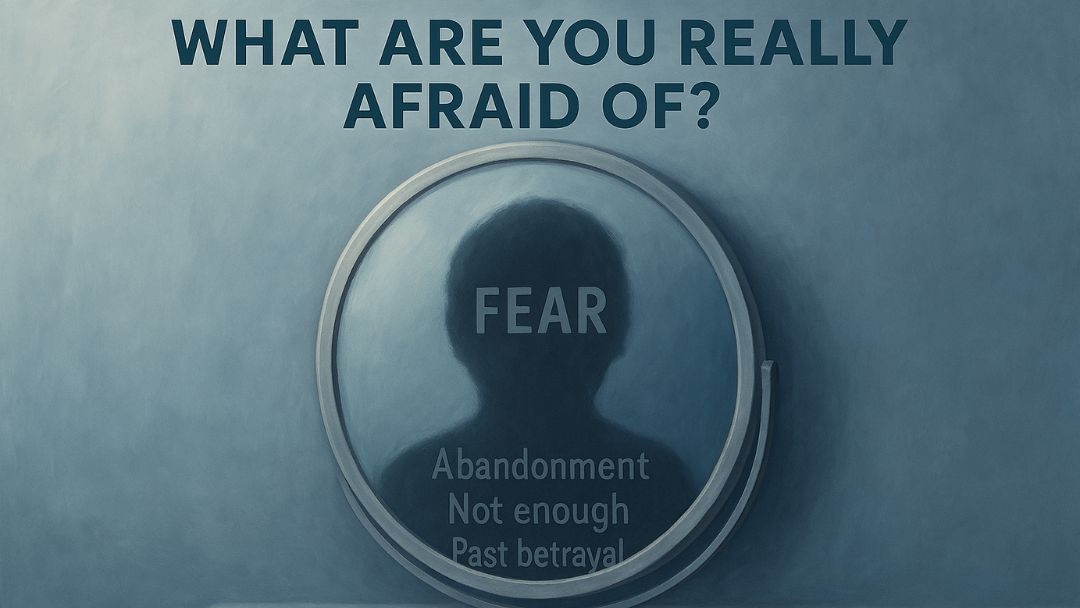
Envy often stems from the feeling that we’re falling behind our peers in significant areas of life. Its root causes include upward social comparisons, a scarcity mindset, low self-esteem, unmet desires, lack of contentment, and past experiences of deprivation.
Jealousy, on the other hand, is typically driven by the fear of losing something or someone important. It often arises from attachment insecurities, a fear of abandonment, possessiveness, past betrayals, a lack of trust, and a diminished sense of self-worth.
Envy Vs. Jealousy: Impact on Relationships
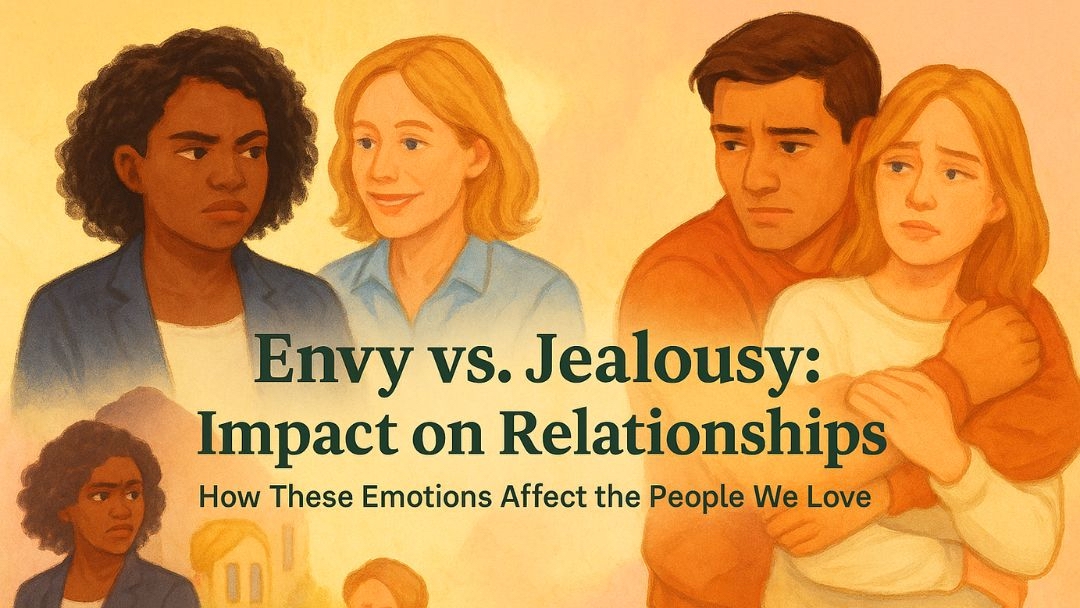
Jealousy often takes center stage in romantic relationships, showing up as suspicion, possessiveness, or controlling behavior from the jealous boyfriend or girlfriend. While less common, envy occurs when one partner feels overshadowed by the other’s success, causing unhealthy competition or silent resentment.
Within families, jealousy often stems from competition for love and attention, while envy arises when one sibling feels less accomplished or favored. Over time, both can breed emotional distance. In friendships, envy mixes admiration with insecurity. You're happy for your friend but also wonder, “Why not me?” Jealousy creeps in when you fear being replaced, often leading to clinginess or passive-aggressive behavior.
At work, envy emerges when someone else receives the recognition you wanted. It can motivate self-improvement or cause disengagement and bitterness. Jealousy shows up when your role feels threatened, triggering tension or rivalry. Both emotions can damage relationships. However, they also reveal what needs healing.
How Envy and Jealousy Show Up in Real Life

Envy usually occurs when you observe other people’s lives and feel you're falling short. Here are real-life situations where you may feel envy.
- Seeing your neighbor in their brand-new car while you're stuck with your old beater.
- Watching someone effortlessly make friends while you struggle socially.
- Observing a peer with a fit body while you’re insecure about your own.
- Finding out an acquaintance just got engaged while you’re still single.
Jealousy often strikes when something you value feels threatened, especially in close relationships. Here are some real-life situations where you might experience jealousy.
- When your parents pour all their attention into your sibling, leaving you sidelined.
- When your best friend starts bonding with a new friend.
- When your child seems more attached to your co-parent or caregiver.
- When your partner compliments someone else’s appearance.
Sometimes, you may feel jealousy and envy simultaneously. Here are some examples.
- You envy your neighbor’s charm and charisma, but you’re also jealous that your partner seems drawn to them.
- You envy your co-worker’s promotion, but you're jealous that your favorite manager is now investing all their energy into mentoring them instead of you.
Is Jealousy Worse than Envy?
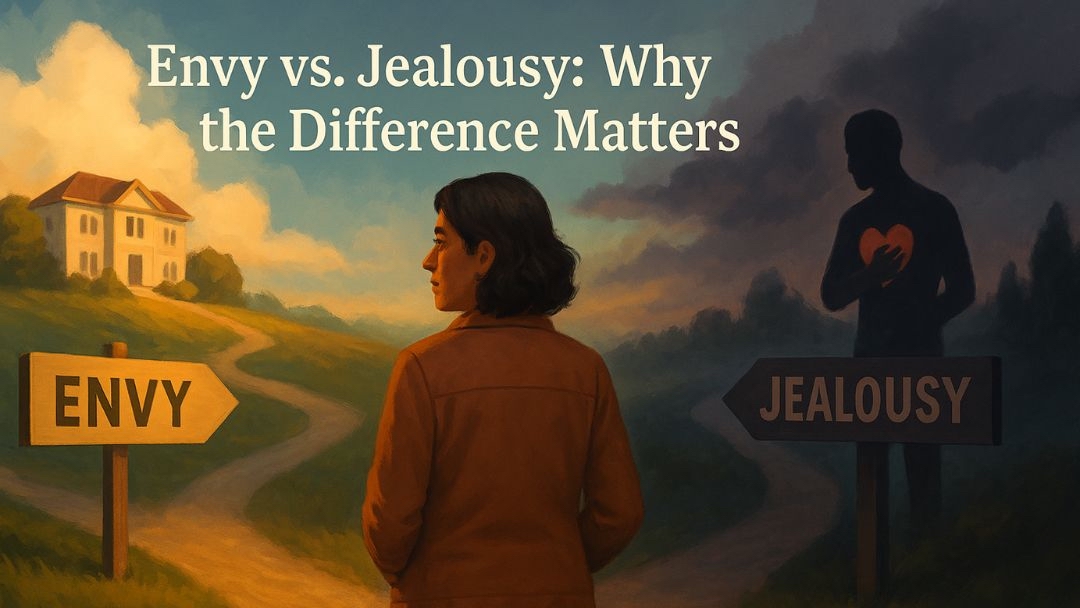
Jealousy is explosive and affects relationships more directly than envy because you believe you’re dealing with a threat to your valued possession. That emotional threat can trigger intense anxiety, possessiveness, and conflict. In contrast, envy feels quiet and internal because it involves silent comparison rather than direct conflict.
Ultimately, it depends on how the two emotions are handled. Jealousy often has more immediate relational consequences, while envy can quietly erode your self-worth or closeness to others. Both can be toxic or transformative depending on your awareness, emotional regulation, and willingness to work through them.
Related: When Your Feelings Take Over: How Emotional Reasoning Distorts Reality
Am I Envious or Jealous? 9 Signs You’re Dealing With Envy or Jealousy

Envy and Jealousy can have devastating impacts on relationships, so it’s essential to know whether you have these traits within you. Use the signs below to figure out which emotion you’re dealing with.
You Might Be Envious If:
- You feel inadequate or bitter when someone else succeeds.
- You scroll social media and silently compare yourself.
- You love to see others fail.
- You think, “They don’t deserve that; I do.”
- You try to compete with or outdo someone to level the playing field.
- You secretly wish you had what someone else has, and feel ashamed about it.
- You think life is unfair because someone else has something you don’t.
- You always find a reason to downplay other people’s achievements.
- You make negative comments disguised as jokes about people’s success.
You Might Be Jealous If:
- You feel threatened when people get close to someone you care about.
- You seek constant reassurance from your partner.
- You constantly check your partner’s phone, social media, or texts without permission.
- You feel uneasy or clingy when your partner spends time with others.
- You imagine scenarios where you’re replaced or left out.
- You isolate your partner from their friends and family.
- You compare yourself to perceived rivals.
- You frequently accuse your partner or friend of being unfaithful without evidence.
- You monitor your partner’s whereabouts and activities under the guise of concern.
5 Practical Tips to Handle Envy
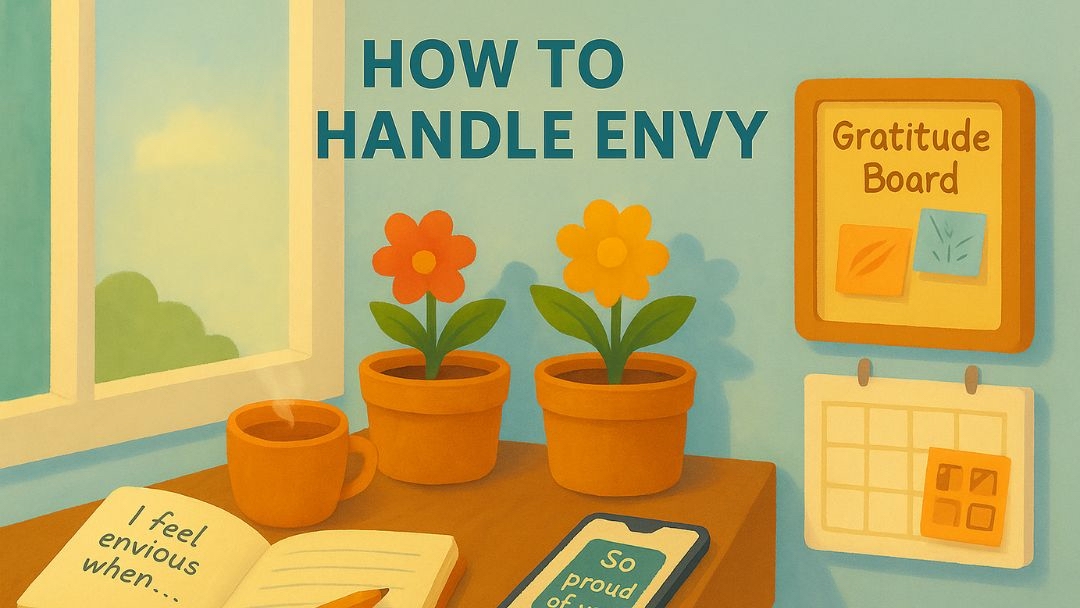
Here are five actionable tips to manage your envy and use it as a fuel for growth.
1. Name What You Envy and Why It Hurts
Ask yourself: What exactly am I envying? Why does it matter to me? You’re likely to discover unmet desires worth pursuing. Grab your journal and finish these prompts:
- “I feel envious when…”
- “This makes me feel like I’m missing…”
- “What I actually want is…”
2. Get Rid of the Scarcity Mindset
Someone else’s success doesn’t mean there’s less success available for you. Multiple people can win. Try the following.
- Write this on a sticky note or note app: “Their win isn’t my loss.”
- Every time envy shows up, read the note out loud and reflect on its meaning.
3. Celebrate Others to Liberate Yourself
Genuinely compliment the person you envy to liberate yourself from bitterness. Choose one person you’re envious of and do one of these:
- Leave a kind comment.
- Send a DM or text congratulating them.
- Mention their success to someone else in a positive way.
4. Detach from Triggers
If constant scrolling or braggy conversations spike your envy, reclaim your environment by doing the following.
- Note who or what consistently makes you feel worse.
- Mute, unfollow, or set app timers for high-trigger social media.
- Replace with 2 creators or communities that emphasize progress, not perfection.
5. Practice Gratitude
Gratitude and envy can’t thrive in the same space because the former roots you in what’s already going right. Start practicing gratitude. Each morning or night, write 3 things you’re grateful for. Keep this gratitude list visible for easy access.
5 Practical Tips to Handle Jealousy

Here are actionable steps to manage jealousy in a healthy, self-aware way.
1. Scrutinize the Fear and Examine the Root Cause
Jealousy isn’t always irrational, but it can sometimes stem from imagined scenarios. Ask yourself: What exactly am I afraid of? Is there evidence that this fear is real? Your scrutiny can help you understand the real cause of your jealousy.
2. Communicate, Don’t Accuse
Talk about your feelings without attacking your partner or friend. Keep the focus on your experience, not their actions.
3. Self-Soothe When Jealousy Flares Up
Create a calming routine, such as deep breathing, stepping outside, journaling, or texting a trusted friend whenever you feel jealous. Self-soothing helps you pause and reflect before reacting.
4. Strengthen Self-Worth
You’re less threatened by others when you believe you are enough. Try the following to build self-worth.
- List 5 strengths or qualities that make you a valuable partner or friend.
- Repeat this affirmation when jealousy hits: “I am secure, even when things feel uncertain.”
5. Build Identity Beyond the Relationship
Jealousy worsens when your identity is tied to one relationship. Ask: Who am I outside of this relationship? Write down 3 roles, talents, or dreams that are yours alone. Block out regular “me time” in your week for hobbies, solo goals, or interests.
Turn Envy and Jealousy into Growth Tools
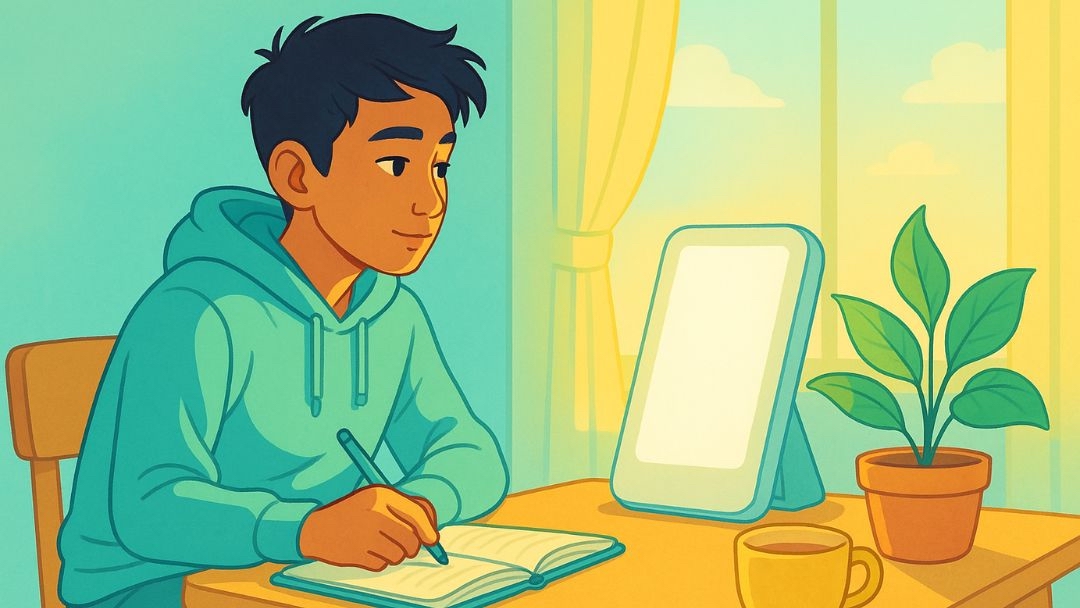
We’re often taught to silence envy and jealousy, treating them as toxic emotions to suppress or avoid. However, these feelings, uncomfortable as they may be, can be powerful signals for personal growth when you approach them with the right mindset and strategy.
Envy reveals what you truly desire. It reflects the hidden dreams or neglected goals you’re ready to reclaim. Ask yourself: What does this reveal about what I want? Then, use that insight to take meaningful action.
Jealousy reveals what matters to you. Use it as an opportunity to reflect, communicate, and become more secure within yourself.
Developing emotional intelligence can help you navigate these emotions more skillfully—turning self-doubt into clarity, and reactive moments into opportunities for connection. Both envy and jealousy, when met with self-awareness and intention, can lead to stronger relationships and authentic personal growth.
So the next time envy or jealousy surfaces, don’t push it away. Ask what it’s trying to tell you. Then, use that insight to become the best version of yourself.


Return to Blog




